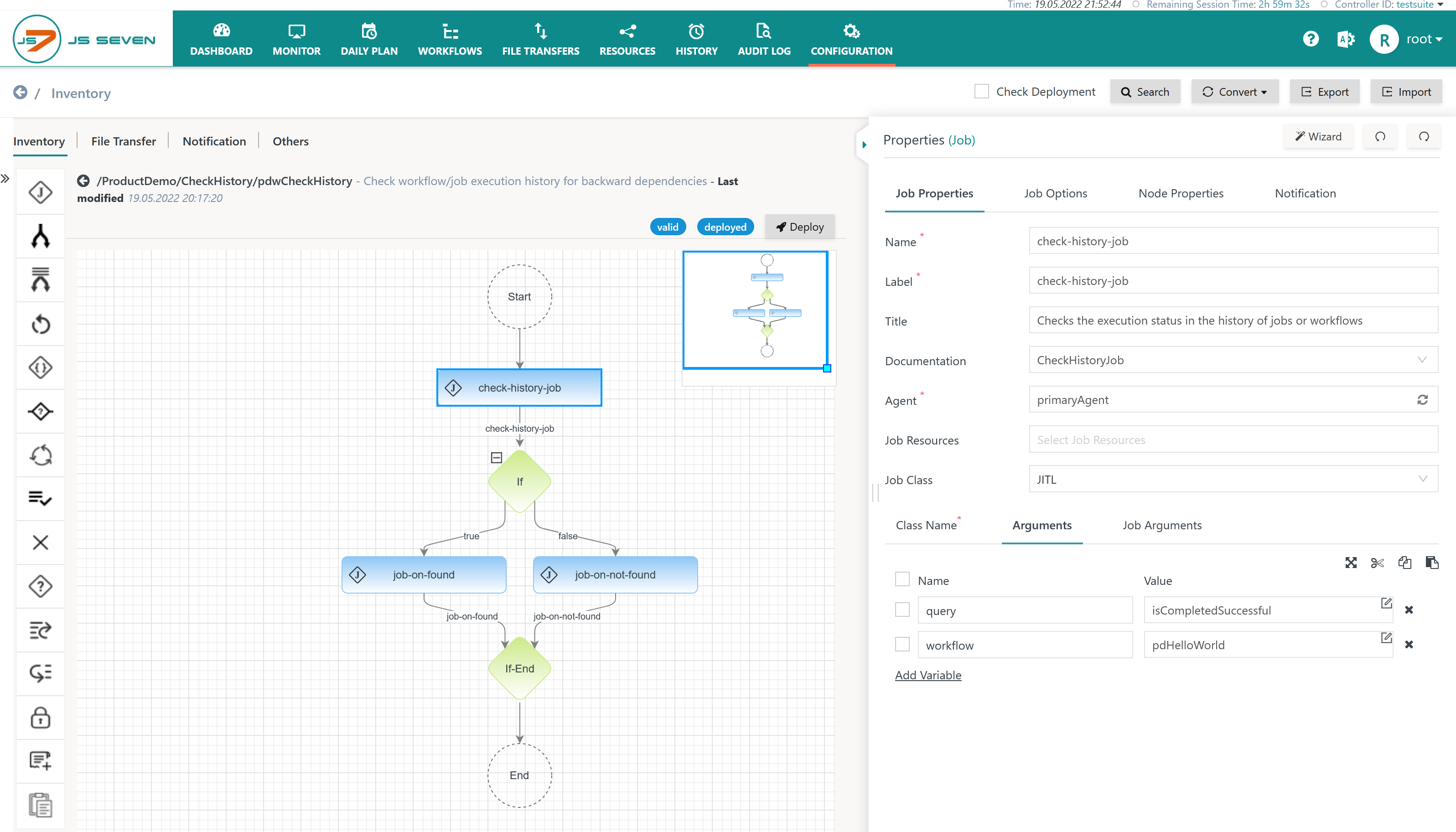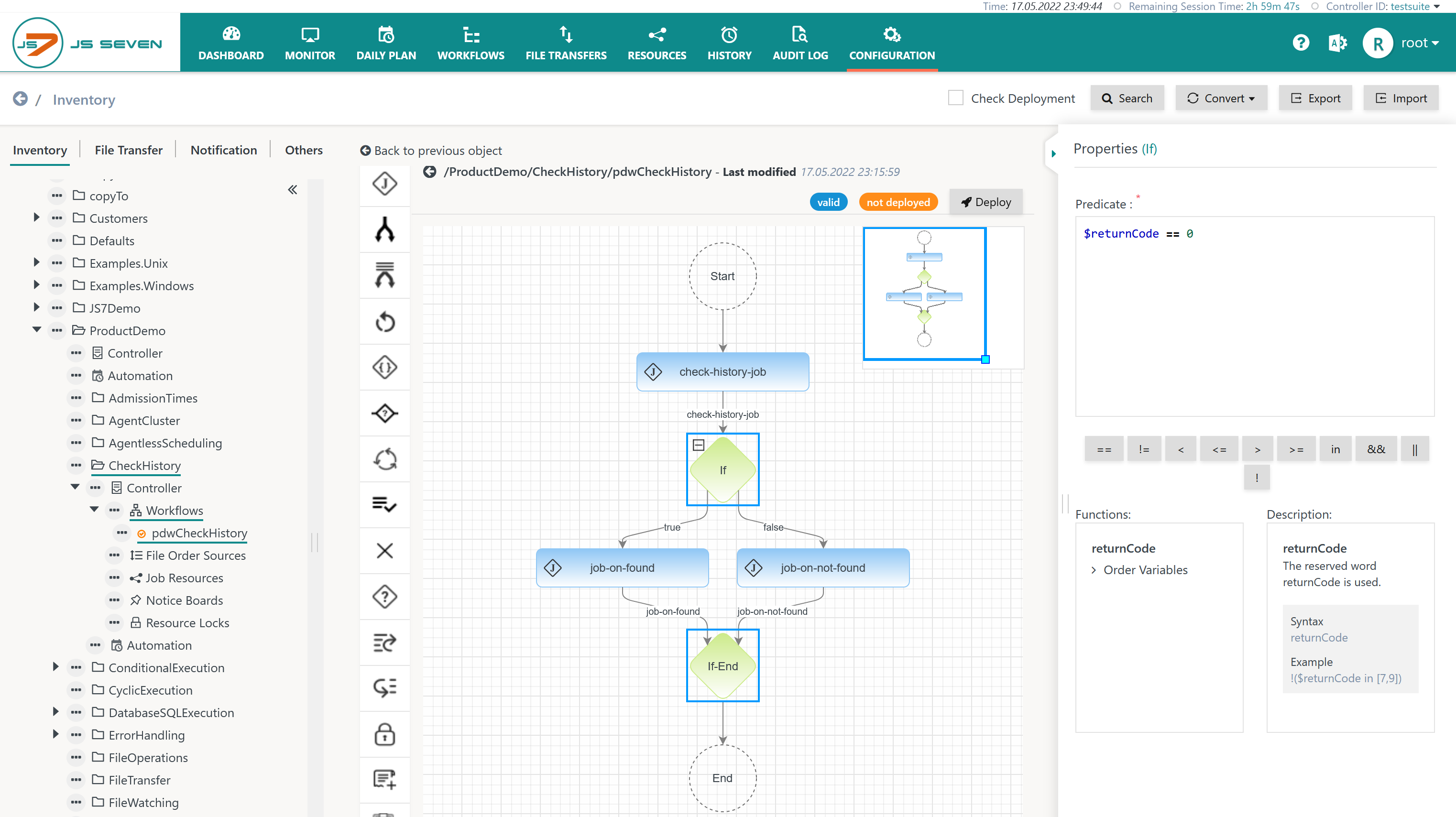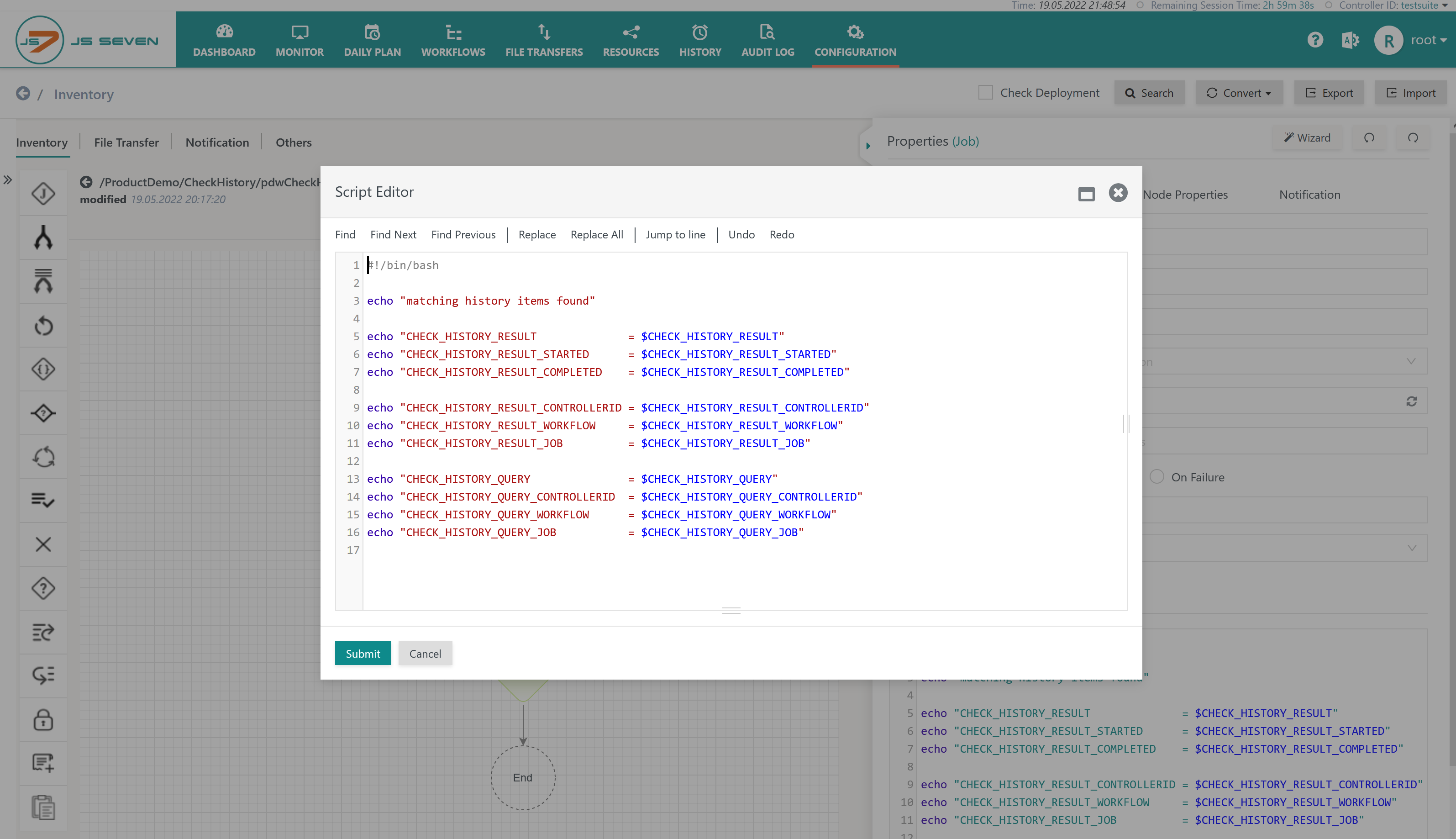Page History
...
- The job template makes use of the JS7 - REST Web Service API to retrieve information from the JS7 - History. Operation of the job template requires
- network access from the Agent that executes the job to the JOC Cockpit instance,
- availability of the Controller and of JOC Cockpit,
- authentication and authorization with JOC Cockpit.
- The job template authenticates with the JS7 - REST Web Service API by use of user account/password and/or by use of a certificate, for details see JS7 - Authentication.
- For details about configuration items see JS7 - JITL Common Authentication.
- The job template checks the execution history of workflows and jobs
- for execution with a start date or completion date in the given period,
- for successful or failed execution results.
...
You can use the job wizard like this:
Explanation:
- Add an empty job from the instruction panel.
- Specify a name and a label for the job.
- Select an Agent.
...
- the history status of orders or jobs:
- completed: the order or job completed successfully or failed.
- completed successful
- completed failed
- the period for which the execution history is looked up for orders and jobs that
- started between two dates
- completed between two dates
- with periods being specified as absolute or relative dates
...
Syntax
Queries are specified from a function and optional arguments.
Functions
| Syntax | Explanation |
|---|---|
<function> | Functions can be used without arguments by stating exclusively the name of the function. |
<function>( argument[, argument] ) | Functions can optionally be specified with one or more arguments that are separated by commas. |
Functions
| Function | Arguments | Default | Explanation |
|---|---|---|---|
isStarted | startedFrom,startedTo, count | startedFrom=0d, startedTo=0d, count=1 |
|
isCompleted | startedFrom,startedTo, completedFrom, completedTo, count | completedFrom=0d, completedTo=0d, count=1 |
|
isCompletedSuccessful | startedFrom,startedTo, completedFrom, completedTo, count | completedFrom=0d, completedTo=0d, count=1 |
|
isCompletedFailed | startedFrom,startedTo, completedFrom, completedTo, count | completedFrom=0d, completedTo=0d, count=1 |
|
lastCompletedSuccessful | startedFrom,startedTo, completedFrom, completedTo, count | completedFrom=0d, completedTo=0d, count=1 |
|
lastCompletedFailed | startedFrom,startedTo, completedFrom, completedTo, count | completedFrom=0d, completedTo=0d, count=1 |
lastCompletedSuccessful |
Arguments
| Argument | Default | Explanation |
|---|---|---|
startedFrom |
startedTo, completedFrom, completedTo, countcompletedFrom=0d, completedTo=0d, count=1- Scope: specifies that the last run of the workflow or job completed successfully.
- Arguments: if the argument
startedFromis specified, then the default value of thestartedToargument is0d. - Default Period: start and completion on the same day.
Arguments
0d | The workflow or job started after the given date. | |||
startedTo | 0d | The workflow or job started before the given date. | ||
completedFrom | 0d | The workflow or job completed after the given date. | ||
completedTo | ||||
| Argument | Default | Explanation | ||
|---|---|---|---|---|
startedFrom | 0d | The workflow or job | started aftercompleted before the given date. | |
count | 0d | The workflow or job started before the given date. | ||
completedFrom | 0d | The workflow or job completed after the given date. | ||
completedTo | 0d | The workflow or job completed before the given date. | ||
1 | The minimum number of history items | count | 1 | The minimum number of history items that is expected to be returned for the given period. By default a single history item is expected. The CheckHistoryJob will fail if the number of expected history entries specified by this argument exceeds the number of history items returned. |
Syntax
...
Absolute Dates
Absolute date can be specified
Absolute Dates
Absolute date can be specified as values to the startedFrom, startedTo, completedFrom and completedTo arguments.
...
| Example | Explanation |
|---|---|
isStarted | Specifies that the workflow or job started today. |
isCompleted | Specifies that the workflow or job completed today independently from its start date. |
isCompletedSuccessful | Specifies that the workflow or job completed successfully today independently from its start date. |
isCompletedFailed | Specifies that the workflow or job failed today independently from its start date. |
isCompleted( startedFrom=0d ) | Specifies that the workflow or job started today and completed today. It is not considered if the workflow or job completed successfully or failed. |
isCompletedSuccessful( startedFrom=0d ) | Specifies that the workflow or job started today and completed successfully today. |
isCompletedFailed( startedFrom=0d ) | Specifies that the workflow or job started today and failed today. |
isStarted( startedFrom=2021-12-05T01:00:00+02:00 ) | Specifies that the workflow or job started after the given point in time. |
isCompletedSuccesfulisCompletedSuccessful( startedFrom=2021-12-05T01:00:00+02:00 ) | Specifies that the workflow or job started after the given point in time and completed successfully. |
isCompletedFailed( startedFrom=2021-12-05T01:00:00+02:00 ) | Specifies that the workflow or job started after the given point in time and failed. |
isCompleted( completedFrom=2021-12-05T01:00:00+02:00 ) | Specifies that the workflow or job completed after the given point in time. |
isCompletedSuccessful( completedFrom=2021-12-05T01:00:00+02:00 ) | Specifies that the workflow or job completed successfully after the given point in time. |
isCompletedFailed( completedFrom=2021-12-05T01:00:00+02:00 ) | Specifies that the workflow or job failed after the given point in time. |
isCompleted( completedFrom=2021-12-05T01:00:00.000Z, completedTo=2022-05-05T01:00:00+02:00 ) | Specifies that the workflow or job completed before the given point in time. |
isCompletedSuccesfulisCompletedSuccessful( completedFrom=2021-12-03T01:00:00+02:00, completedTo=2021-12-05T01:00:00+02:00 ) | Specifies that the workflow or job completed successfully before the given point in time. |
isCompletedFailed( completedFrom=2021-12-04T01:00:00+02:00, completedTo=2022-12-05T01:00:00+02:00 ) | Specifies that the workflow or job failed before the given point in time. |
lastCompletedSuccessful | Specifies that the last run of the workflow or job completed successfully. |
lastCompletedFailed | Specifies that the last run of the workflow or job failed. |
lastCompletedSuccessful( startedFrom=-11d, startedTo=-1d ) | Specifies that the last run of the workflow or job started in the given period and completed successfully today. |
lastCompletedFailed( startedFrom=-11d, startedTo=-1d ) | Specifies that the last run of the workflow or job started in the given period and failed today. |
lastCompletedSuccessful( completedFrom=-11d, completedTo=-1d ) | Specifies that the last run of the workflow or job completed successfully in the given period. |
lastCompletedFailed( completedFrom=-11d, completedTo=-1d ) | Specifies that the last run of the job failed in the given period. |
...
The Job Documentation including the full list of arguments can be found underfrom: https://www.sos-berlin.com/doc/JS7-JITL/CheckHistoryJob.xml
| Anchor | ||||
|---|---|---|---|---|
|
The CheckHistoryJob template accepts the following arguments:
| Name | Required | Default Value | Purpose |
|---|---|---|---|
query | yes | n/a | Specifies the expression that is used to look up the execution history, for example isCompleted, isCompletedSuccessful etc., for the full list see Queries. |
| no | n/a | Specifies the name of a workflow for which the execution history is looked up. A |
job | no | n/a | Specifies the name of a job for which the execution history is looked up. A workflow name or job name has to be specified. |
controller_id | no | n/a | The identifier of a Controller can be specified to limit results to workflows and jobs executed with the indicated Controller. |
| Anchor | ||||
|---|---|---|---|---|
|
The CheckHistoryJob template returns the following variables:
| Return Variable | Data Type | Purpose | Example |
|---|---|---|---|
js7CheckHistoryResult | Boolean | Returns the Boolean result of the query. | true, false |
| String | Returns the Controller ID of the resulting history entry. The value of the return variable is empty if the query returns no result. If the query returns a result then the return variable holds the Controller ID of the youngest resulting history entry. | controller |
js7CheckHistoryResultWorkflow | String | Returns the workflow name of the resulting history entry. The value of the return variable is empty if the query returns no result. | check_history |
js7CheckHistoryResultStartedjs7CheckHistoryResultJob | DateString | Returns the start date and time job name of the resulting history entry. The value of the return variable is empty if the query returns no result. | 2012check-12-05T01:00:00+02:00history-job |
js7CheckHistoryResultStartedjs7CheckHistoryResultCompleted | Date | Returns the completion start date and time of the resulting history entry. The value of the return variable is empty if the query returns no result. If the query returns a result then the return variable contains holds the completion start date and time of the youngest resulting history entry in ISO-8601 format. | 2012-12-05T01:00:00+02:00 |
js7CheckHistoryQueryjs7CheckHistoryResultCompleted | StringDate | Returns the value completion date and time of the The value of the | isStarted |
js7CheckHistoryQueryWorkflow | String | Returns the value of the Returns a copy of the value of the | accounting |
returns no result. If the query returns a result then the return variable contains the completion date and time of the youngest resulting history entry in ISO-8601 format. | 2012-12-05T01:00:00+02:00 | ||
js7CheckHistoryQueryjs7CheckHistoryQueryJob | String | Returns the value of the Returns a copy of the value of the | my-jobisStarted |
...
|
...
The CheckHistoryJob template authenticates with the JS7 - REST Web Service API by use of user account/password and/or by use of a certificate, for details see JS7 - Authentication.
...
| String | Returns the value of the Returns a copy of the value of the | controller | |
js7CheckHistoryQueryWorkflow | String | Returns the value of the Returns a copy of the value of the | accounting |
js7CheckHistoryQueryJob | String | Returns the value of the Returns a copy of the value of the | my-job |
Job Dependencies
The CheckHistoryJob template can be used to implement backward job dependencies:
- Jobs based on the CheckHistoryJob template do not fail if the underlying query does not return results.
- Instead, the CheckHistoryJob template provides Return Variables that can be inspected to determine further execution of jobs in a workflow.
- JS7 offers the JS7 - If Instruction to check the values of Return Variables and to decide what instructions to execute next.
Download (upload .json): pdwCheckHistory.workflow.json
Explanation:
- Arguments of the CheckHistoryJob template include to specify the
queryandworkflowthat is looked up in the execution history. - The query isCompletedSuccessful checks if the indicated workflow was successfully executed during the current day.
Explanation:
- The JS7 - If Instruction is used to check the
$returnValuereturn variable that carries- the value 0 if the query of the CheckHistoryJob template returns one or more hits.
- the value 1 if the query of the CheckHistoryJob template returns no hits.
- Alternative solutions include to check the value of the
$js7CheckHistoryResultreturn variable for a Boolean value that indicates if the query did return any hits:$js7CheckHistoryResult == true$js7CheckHistoryResult == false
- The above example executes a successor job based on the result of the CheckHistoryJob. Such jobs have access to any Return Variables:
- If the successor job is a Shell job then
- Return Variables can be mapped to environment variables like this:
- the job script can make use of environment variables like this:
- Return Variables can be mapped to environment variables like this:
- If the successor job is a JVM job then Return Variables can be accessed directly.
- If the successor job is a Shell job then
Further Resources
| Code Block | ||||
|---|---|---|---|---|
| ||||
js7 {
auth { ... }
configuration { ... }
job { ... }
web { ... }
api-server {
# API Server URL
url = "https://joc-2-0-primary:4443"
# Option 1: use of a Credential Store
cs-file=${js7.config-directory}"/private/secret.kdbx"
cs-key=${js7.config-directory}"/private/secret.key"
cs-password="secret"
# Option 1: use of references to credentials
account="/myAccounts/joc@username"
password="/myAccounts/joc@password"
# Option 2: Use of account and password
account="root"
password="root"
}
} |
Explanation:
- The
api-serverconfiguration section specifies authentication details for the CheckHistoryJob and can occur in any position directly within thejs7configuration block. - Configuration items available from this configuration section are explained with the following chapters.
Certificate Based Authentication
For JS7 - Certificate based Authentication configured with the ./config/private/private.conf file
- the
urlconfiguration item is required that specifies the URL of the JS7 REST Web Service API. Typically this corresponds to the JOC Cockpit URL.- Users can set up a number of JOC Cockpit instances that are clustered for automated fail-over.
- Users can set up a load balancer that routes requests to a number of available JOC Cockpit instances.
- For use with the CheckHistoryJob template both active and standby JOC Cockpit instances can be used.
- the Client Authentication Certificate has to be available from the keystore file indicated with the
js7.web.https.keystoreorjs7.web.https.client_keystoresettings.
User Account / Password Authentication
For user account/password authentication configured with the ./config/private/private.conf file
- the
urlconfiguration item is required as explained above. - the user
accountandpasswordcan be specified from the following options:- Option 1: Use of a JS7 - Credential Store
- with the following settings:
cs-file:Specifies the path to a KeePass database file.cs-key: Specifies the path to a KeePass key file.cs-password: Specifies the password for the KeePass database file.account: Specifies the path to the entry in the KeePass database that holds the account name.password: Specifies the path to the entry in the KeePass database that holds the password.
- that suggest to preferably use a KeePass key file (
cs-key) to protect the KeePass database. Basically it is pointless to protect a Credential Store by use of a password (cs-password) that is similarly visible as putting the key under the mat. Use of a key file allows to apply OS ownership and file permissions to protect to the key file from 3rd parties.
- with the following settings:
- Option 2: Use of user account and password
- with the following settings:
account: Specifies the account name.password: Specifies the plain text password.
- that include both settings to be visible from the configuration file.
- with the following settings:
- Option 1: Use of a JS7 - Credential Store
Job Dependencies
The CheckHistoryJob template can be used to implement job dependencies
...




